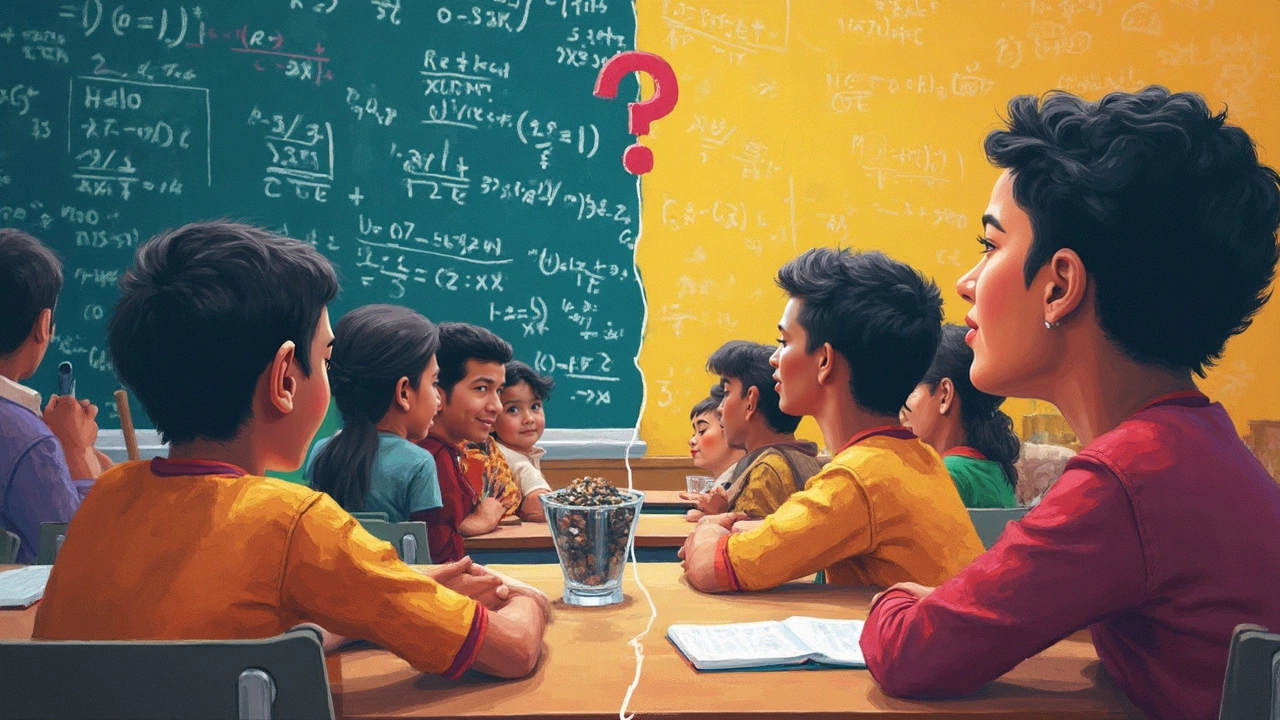Picture this: you're sitting at the dining table, papers all over, your parents stressing about which board will give you the best future. Every family in India gets wound up debating which school board is the toughest. It’s not just about bragging rights—this choice affects your daily life, your mental health, and sometimes, the snacks you get after exams.
The whole 'toughest board' thing isn’t as black-and-white as it sounds. There’s a lot more to it than just difficult textbooks or scary teachers. Some boards focus on cramming facts, others try to push creativity. The big names you’ll hear are CBSE, ICSE, State Boards, IB, and Cambridge. Each has its die-hard fans and critics.
If you want clear facts, real-life examples, and some tried-and-tested survival tips (hey, I’ve been there, my husband Anil too!), keep reading. You’ll see how CBSE’s syllabus really stands up against the rest, and what you can actually do if you're feeling overwhelmed with homework and competition. No nonsense, just the stuff you wish someone actually told you.
- How Indian School Boards Differ
- What Makes a Syllabus 'Tough'?
- CBSE Syllabus: Breaking Down the Hype
- Other Boards: ICSE, State, IB, and Cambridge
- Tips for Surviving and Thriving, No Matter Your Board
How Indian School Boards Differ
The school board you pick isn’t just about which books you’ll use—it can set the mood for your whole school life. Indian education has loads of boards, but the big names you’ll keep hearing are CBSE, ICSE, State Boards, IB, and Cambridge. Each one has its own way of doing things, shapes what type of stuff you learn, and even affects how you’re tested.
Let’s break down what really stands out about each:
- CBSE: This board is everywhere in India—think of it as the default setting. It’s backed by the central government and most kids taking competitive exams like JEE or NEET are from here. The syllabus is textbook-heavy, especially in science and maths, but less on creative subjects. You’ll see the NCERT logo everywhere.
- ICSE: Managed by CISCE, this board is well-known in big cities. The syllabus is pretty detailed and goes deep into English, arts, and practical skills, not just rote facts. Exams are a bit trickier for those who hate essay-type answers.
- State Boards: Every state has its own board, so the books and language of instruction change a lot. The syllabus sometimes gets updated slower compared to CBSE or ICSE. The focus can be more regional, but it’s usually seen as less stressful for daily workload.
- IB and Cambridge: These sound fancy, right? They’re international boards, found in posh metro schools. The idea is to build skills like research and debate, not just mark sheets. IB especially pushes projects and presentations. Exams are tough for anyone used to just memorizing.
Here’s a quick comparison that should clear things up:
| Board | No. of Schools (approx.) | Main Focus | Exam Style |
|---|---|---|---|
| CBSE | 27,000+ | Science, Maths, National exams | Objective + Short answers |
| ICSE | 2,500+ | English, Projects, Detailed Study | Long answers + Internal assessment |
| State Boards | Every state varies | Regional content, Local language options | Theory mostly |
| IB | 200+ | Projects, Global learning | Coursework + Presentations |
| Cambridge | 400+ | Application, Global curriculum | Written + Oral exams |
If you’re aiming for Indian entrance exams, most people say stick to CBSE because of direct syllabus overlap. But what feels toughest depends not just on textbooks—it’s how you like to learn and what you want in the future.
What Makes a Syllabus 'Tough'?
Everyone loves to argue about which board is the hardest, but let’s get real: what actually makes a syllabus tough? It’s not just about thick textbooks or a long list of chapters. The way subjects are taught, how exams are set, and even the number of projects or assignments play a big role.
Here are a few things that usually raise the bar on ‘toughness’:
- Depth vs. Breadth: Some boards go deep, while others cover loads of topics but not as much detail. For example, CBSE is known for focusing on concepts that matter in entrance exams, but ICSE goes deep into details especially in English and Science.
- Style of Exams: Boards that ask tricky application-based questions tend to feel more stressful. CBSE tries to balance direct questions with application, while IB throws in a lot of analytical, open-ended ones.
- Continuous Assessment: If you’re graded on loads of projects, oral tests, and even how much you talk in class, that adds up. Some boards have more internal assessment.
- Language Level: Higher-level English, like in ICSE, can trip up even native speakers.
Rohit Kumar, an education consultant from Delhi, puts it this way:
"A tough syllabus isn’t just about heavy books. It’s about how much you’re actually expected to process and perform, day after day. Some boards pile up detail, others pressure you with problem-solving."
The numbers also tell a story. Here’s a simple comparison:
| Board | Subjects Offered (Class 10) | % Application-Based Questions | Main Medium of Assessment |
|---|---|---|---|
| CBSE | 5-7 (Avg) | 30-40% | Written/Projects |
| ICSE | 8-10 (Avg) | 20-30% | Written/Oral/Projects |
| State Boards | 4-7 (Avg) | 15-20% | Mostly Written |
| IB | 6 (Fixed) | 50%+ | Projects/Essays/Exams |
| Cambridge | 6-8 (Varies) | 40-60% | Written/Practical/Oral |
But here’s the catch — toughness is also about fit. Some students breeze through a detailed syllabus, while others shine in boards that push application and creativity. If you pick a board just because it’s labeled the ‘toughest,’ you might end up more stressed than challenged.
So before you judge, look at what actually makes a board hard — is it memorizing pages, solving tricky problems, or juggling endless assignments? That’s where the real answer hides.

CBSE Syllabus: Breaking Down the Hype
First things first: CBSE isn’t tougher just because it’s popular or backed by the government. The main reason so many schools and parents prefer it is because it's predictable, fair, and widely accepted. But let’s unpack what’s actually inside the CBSE syllabus, especially if you’re worried about how hard it really is.
The CBSE syllabus is designed by the National Council of Educational Research and Training (NCERT), and it's no secret that the system is built to fit national entrance exams like NEET and JEE. Topics are well-aligned with what shows up in those big exams. The pattern? Each subject is chunked into units with clear weightage, so there’s less room for surprises. If you ever wondered why everyone seems to have a guidebook for every subject, this is why.
Here’s a snapshot of what stands out in CBSE:
- No excessive memorization: Compared to some boards, CBSE focuses on understanding rather than rote learning, especially from Class 9 onwards. That said, there’s still plenty to remember.
- Emphasis on Science and Math: The syllabus pushes you to get the fundamentals right, which is helpful if you’re eyeing engineering or medical fields.
- Standardized Testing: Exams are set with guidelines, which means if you solve enough past years’ papers, you’ll spot repeating patterns.
- English is straightforward: Literature and grammar sections are less stressful compared to boards like ICSE—no random poems hiding major marks.
Let’s talk numbers for a second. CBSE has more than 27,000 affiliated schools in India and abroad (as of 2024). That’s huge, and it means your books, notes, and online resources are much easier to find. Here’s a quick breakdown of student performance from last year’s Class 10 and Class 12 CBSE board exams:
| Exam Year | Class 10 Pass % | Class 12 Pass % | No. of Students |
|---|---|---|---|
| 2023 | 93.12% | 87.33% | ~4.5 million (combined) |
| 2024 | 93.60% | 87.98% | ~4.55 million (combined) |
Notice how the pass percentages are pretty high? It doesn’t mean it’s a walk in the park, but CBSE does streamline things so you’re not completely lost. The real “toughness” comes when you’re aiming to be a topper. The competition is intense, and scoring 99% is ridiculously harder than just passing.
One major relief? The focus is shifting toward objective, application-based questions now. Multiple choice questions have started showing up, so pure mugging doesn’t always work. If you’re good at basics and practice a lot of sample questions, you’re set for decent scores. My tip: pace your study, keep those NCERT textbooks close, and never ignore sample papers—they’re closer to the board exam pattern than fancy side books.
Other Boards: ICSE, State, IB, and Cambridge
So you've heard about CBSE, but what about the other boards like ICSE, State Boards, IB, and Cambridge? Each of these has a style and reputation that can seriously affect your school life. If you hop onto school forums or chat with older cousins, opinions about which is harder or better can get wild. Here’s the lowdown—no fluff, just real facts and what it means for students.
CBSE pops up everywhere, but ICSE is right behind when it comes to recognition and popularity. ICSE (Indian Certificate of Secondary Education) is known for its in-depth approach to English and social sciences. The syllabus asks for long answers, detailed projects, and even lab work at the school level. Students often feel the pressure—English in ICSE can be tougher than you’d guess! Scoring really well in ICSE is possible, but you’ve got to be good with writing and time management. The focus isn’t just about exams; practical projects matter, too.
State Boards change their syllabus and marking from state to state. Some are easier with theory, some surprisingly tough with language or regional history. The good thing? You get a syllabus that’s locally relevant and easier to connect with. The challenge? If you want to switch to a national entrance exam like JEE or NEET later, the jump in pattern and content from State Boards can be harsh. A fun fact—across most states, the pass percentage for public exams is higher than national boards, but full marks are rare because questions test memory more than concepts.
Now for the international crowd: the IB (International Baccalaureate) and Cambridge (IGCSE and A Levels) boards. These are worlds apart when compared to the rest. IB is famous for focusing on critical thinking and projects over rote learning. Students do lots of presentations, essays, and even community service. Cambridge, too, expects you to research, think and write in your own words. Both boards are demanding in a different way—you might get less homework but more long-term assignments. There’s also no spoon-feeding: teachers guide, but students are expected to research and explore independently.
As for the “toughest board” question, the answer depends on what ‘tough’ means to you. If you struggle with writing long essays, ICSE or IB might feel tougher. If you hate theory-heavy subjects and love projects, Cambridge or IB could suit you. For kids sticking to Indian competitive exams, switching boards can mean extra study or coaching to cope with new subjects and exam formats.
- If you’re aiming for Indian entrance exams, CBSE is usually better aligned.
- If you want global exposure and flexible learning, IB or Cambridge is worth considering.
- If local syllabus and language matter, or if you want less academic pressure, State Boards can work—just plan well if you want to switch to national or global courses later.
Every board has its curveballs. Ask around, look up syllabuses, and choose what fits your goals, not just what’s trending for your neighbors.

Tips for Surviving and Thriving, No Matter Your Board
No matter if you’re under the CBSE banner or any other board, feeling overwhelmed is pretty common. The good news? Small changes in how you study (and even how you think!) can make a huge difference. Here’s what actually works, backed by parents, teachers, and top students chasing those big dreams like IIT, NEET, or getting into top colleges abroad.
"Boards matter, but learning how to learn matters even more. Your habits will carry you farther than memorizing any chapter ever will." – Rishi Kapoor, Principal, Delhi Public School
Let’s get practical. Here’s a checklist of things you can count on:
- Break subjects down: Don’t aim to master a whole textbook at once. Divide chapters into mini-goals so you see progress faster and don’t lose confidence.
- Use NCERT books, even for other boards: Toppers from ICSE, State Boards, and even IB say NCERT textbooks are the ‘go-to’ for basics, especially for national exams.
- Schedule downtime: Your brain isn’t a robot. A study by AIIMS in 2022 showed that brains retain information 30% better with short breaks.
- Ask for help early: Whether it’s your teacher, a friend, or an online tutor, don’t wait till you’re drowning. The earlier you clear a doubt, the smoother things stay.
- Practice mock tests: If you’re CBSE, try CBSE-style sample papers; for ICSE or IB, look for their own formats. Practicing in timed conditions is key.
- Stay organized: Use apps like Google Keep or basic sticky notes so nothing slips past you—assignment deadlines, important topics, or revision dates.
- Keep your phone (mostly) away: The average Indian teen spends 4-5 hours on their phone daily. Try the 20-5 rule: 20 minutes of study, 5 minutes to check your phone or stretch.
If you like numbers, here’s what students actually struggle with, across all boards:
| Challenge | Percentage of Students Affected* |
|---|---|
| Exam stress | 65% |
| Time pressure | 57% |
| Concept backlogs | 48% |
| Lack of motivation | 41% |
*Based on a 2024 survey of 2,000 high schoolers across India by Careers360
Your board does set the rules, but at the end of the day, it’s your habits and how you tackle the daily grind that sets you apart. I can vouch for the difference a clear routine made for my son, especially when he was glued to YouTube ‘study-with-me’ videos all day. Real results come from action, not wishful thinking. Make your plan, stick with it (even loosely), and you’ll outlast the pressure—no matter what board you’re on.



